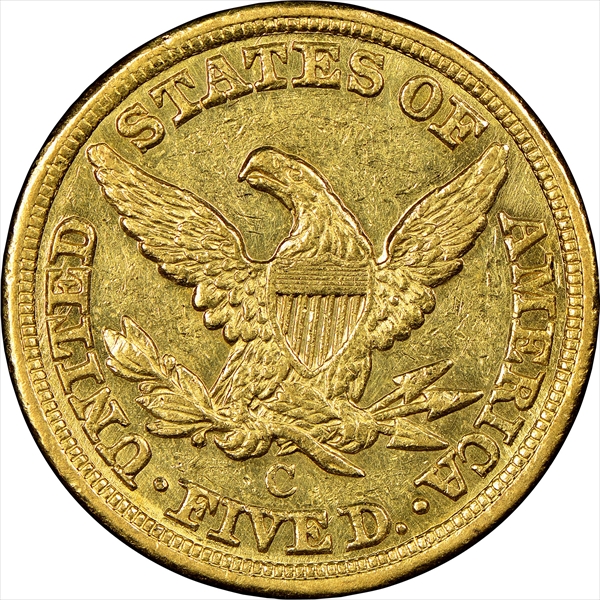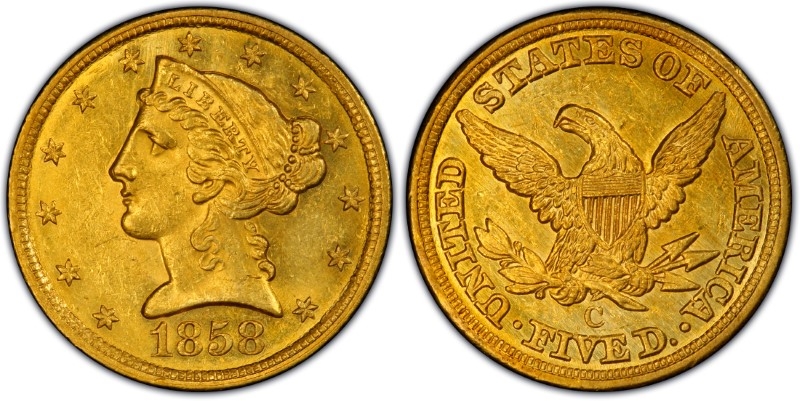1858-C $5 MS 61 PCGS号8277
拥有者评论
1858-C Half Eagle, MS61
Collectible Charlotte Type Coin
1858-C $5 MS61 NGC. Variety 1. Two die pairs exist for the '58-C five. The mintmark is further west on Variety 1 than on the rarer Variety 2. This peach-gold Charlotte half eagle is well defined and displays minimal contact. Liberty's cheek is particularly smooth. Portions of the fields are moderately granular, as made due to shallow strike-throughs.
专家评论
Doug Winter
The 1858-C is the most common half eagle from the Charlotte Mint in terms of high grade rarity and one of the most common in terms of total number known to exist. Since it is a common issue that tends to be well made, it is popular with type collectors in addition to date collectors.The 1858-C is among the more common Charlotte half eagles. It is readily available in Extremely Fine and About Uncirculated grades, and it is not hard to locate in the lower About Uncirculated grades. In properly graded AU55 to AU58 it is scarce. This is still a very rare coin in Uncirculated with just a dozen or so known. I have never personally seen a coin that I graded better than MS63 and only one at that level.
STRIKE: The 1858-C is one of the best struck Charlotte half eagles. The obverse is usually well defined with just a bit weakness typically seen on the curls around the face. The top of the head and the bun tend to be quite sharp, as are the stars and the denticles. The reverse is also well struck, although not quite as boldly as the obverse. The head and the neck of the eagle can sometimes show flatness, but the legs and the feathers are generally sharp. The lettering and the denticles are also sharp, although I have seen some that had flatness on the border form 9:00 to 11:00.
SURFACES: As with most Charlotte half eagles from this era, it is hard to locate an 1858-C that does not show nicks, scratches and small defects on the surfaces. Overall, this is still a cleaner issue than most struck at the Charlotte Mint and many examples have surfaces that are clearly above average.
LUSTER: The luster is above average. On some it is frosty with a slightly granular texture. A smaller number are semi-prooflike with reflectiveness seen in the obverse fields. The luster is often impaired as a result of having been cleaned or processed in the past.
COLORATION: The natural coloration can be extremely attractive, with a medium orange-gold hue and greenish overtones. I have also seen some 1858-C half eagles that had very nice natural coppery-gold color. This used to be a fairly easy issue to find with good color, and while it is still more available as such than most Charlotte half eagles, the number of truly original 1858-C half eagles is shrinking every year.
EYE APPEAL: The 1858-C has above average eye appeal. It is generally seen with a very good strike and nice luster. While most have a number of noticeable abrasions, there are some really attractive examples known with lovely color and a pleasing overall appearance. Coins with this level of eye appeal are very popular with type collectors.
DIE CHARACTERISTICS: All examples seen by me have two small raised die lumps on the cheek of Liberty. There is also a small raised die scratch that travels upwards form the base of the I in LIBERTY. There are also patches of die scratches near the first A in AMERICA and over the RI in AMERICA.
DIE VARIETIES: There are two varieties known.
Variety 1 (formerly 26-K): The 1 in the date is centered in the field between the bust and the denticles. The second 8 is a little closer to the denticles than to the bust. The reverse was first used in 1858 and was then reused to strike all of the 1861-C half eagles. The mintmark is large and its right edge is over the left edge of the upright of the E in FIVE. The left edge of the mintmark is over the left serif of the V. The mintmark is twice as close to the feathers as to the V below.
Variety 2 (formerly 26-L): The obverse is the same as seen on variety 1. The reverse was used only in 1858. On this variety, the mintmark is placed to the right and is closer to the branch. The center of the mintmark is place above the left side of the E in FIVE. There is a heavy die crack at 7:00 from the border to the U in UNITED and this probably accounts for the rarity of the variety.
David Akers (1975/88)
This date is very similar in overall rarity to the 1855-C, 1856-C and 1857-C. It is rare in all grades and I have personally seen only two or three that I would grade uncirculated. VF or EF examples are generally all one should expect although an occasional AU is available.
PCGS #
8277
设计师
Christian Gobrecht
边缘
Reeded
直径
21.65 毫米
重量
8.36 克
铸币数量
38856
金属成分
90% Gold, 10% Copper
更高评级数量
8
评级较低的钱币数量
227
地区
The United States of America
价格指南
PCGS 数量报告
拍卖 - PCGS 评级的
拍卖 - NGC 评级的
稀有性和存量估计 了解更多
| 所有评级 | 750 |
| 60或以上 | 16 |
| 65或以上 | 0 |
| 所有评级 | R-5.5 |
| 60或以上 | R-9.3 |
| 65或以上 | R-10.1 |
| 所有评级 | 110 / 112 TIE |
| 60或以上 | 77 / 112 TIE |
| 65或以上 | 1 / 112 |
| 所有评级 | 155 / 218 TIE |
| 60或以上 | 106 / 218 TIE |
| 65或以上 | 1 / 218 |

























